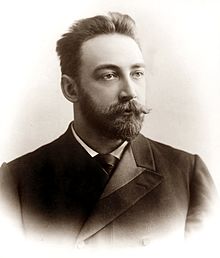Pyotr Lebedev
| Pyotr Nikolaevich Lebedev | |
|---|---|
 |
|
| Born |
24 February 1866 Moscow, Russian Empire |
| Died | 1 March 1912 (aged 46) Moscow, Russian Empire |
| Residence |
|
| Nationality |
|
| Fields | Physicist |
| Institutions | Moscow State University |
| Doctoral advisor | August Kundt |
| Known for | Demonstration of radiation pressure |
Pyotr Nikolaevich Lebedev (Russian: Пётр Николаевич Лебедев) was a Russian physicist. His name was also transliterated as Peter Lebedew and Peter Lebedev.
He made his doctoral degree in Strasbourg under the supervision of August Kundt in 1887–1891. In 1891 he started working in Moscow State University in the group of Alexander Stoletov. There he made his famous experimental studies of electromagnetic waves. He was the first to measure the pressure of light on a solid body in 1899. The discovery was announced at the World Physics Congress in Paris in 1900, and became the first quantitative confirmation of Maxwell's theory of electromagnetism. In 1901 he became a professor of Moscow State University, however he quit the University in 1911, protesting against the politics of the Ministry of Education. In the same year he received an invitation to become a professor in , which he rejected. He died the next year.
The Lebedev Physical Institute in Moscow and the lunar crater Lebedev are named after him.
...
Wikipedia
